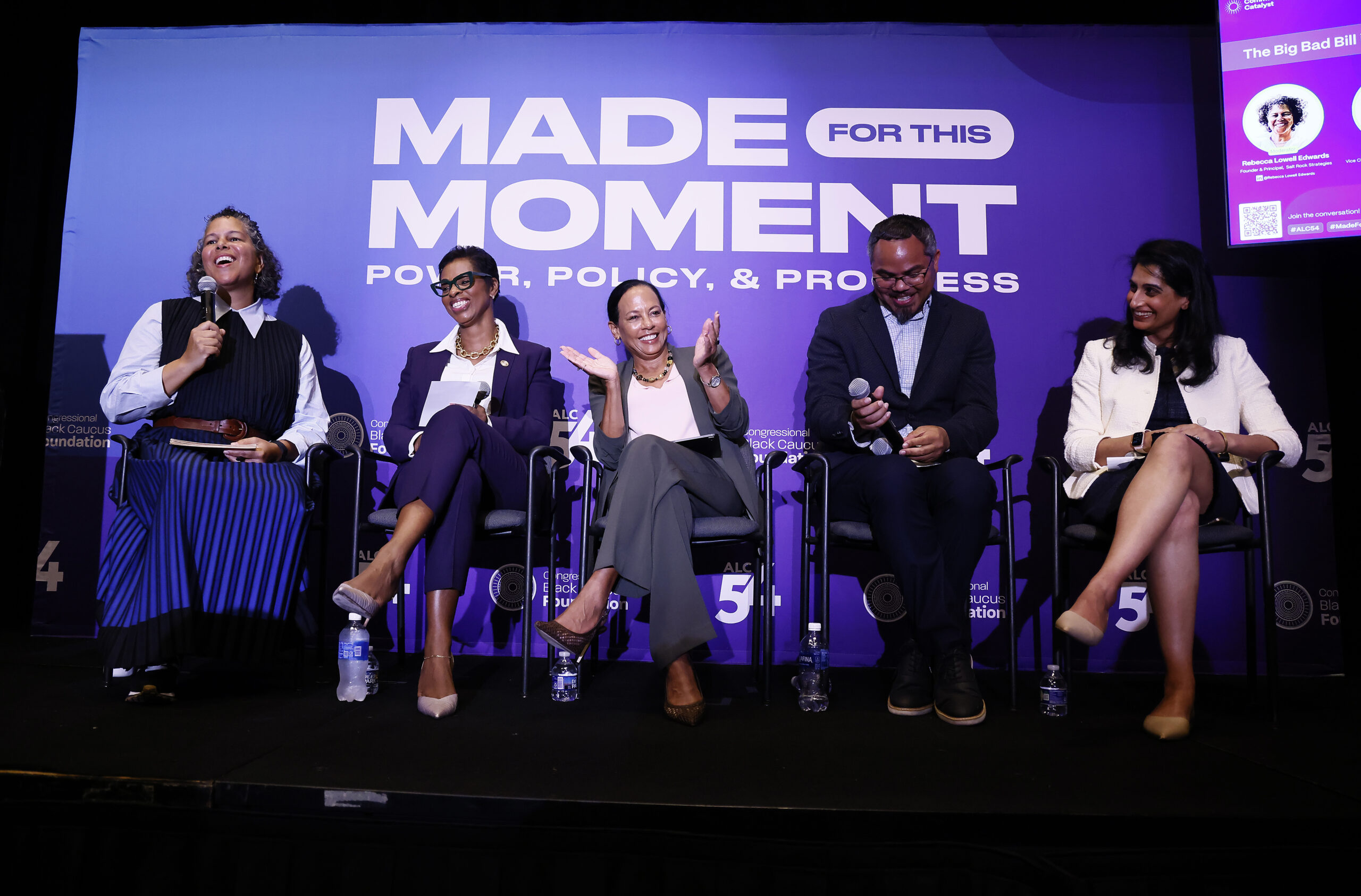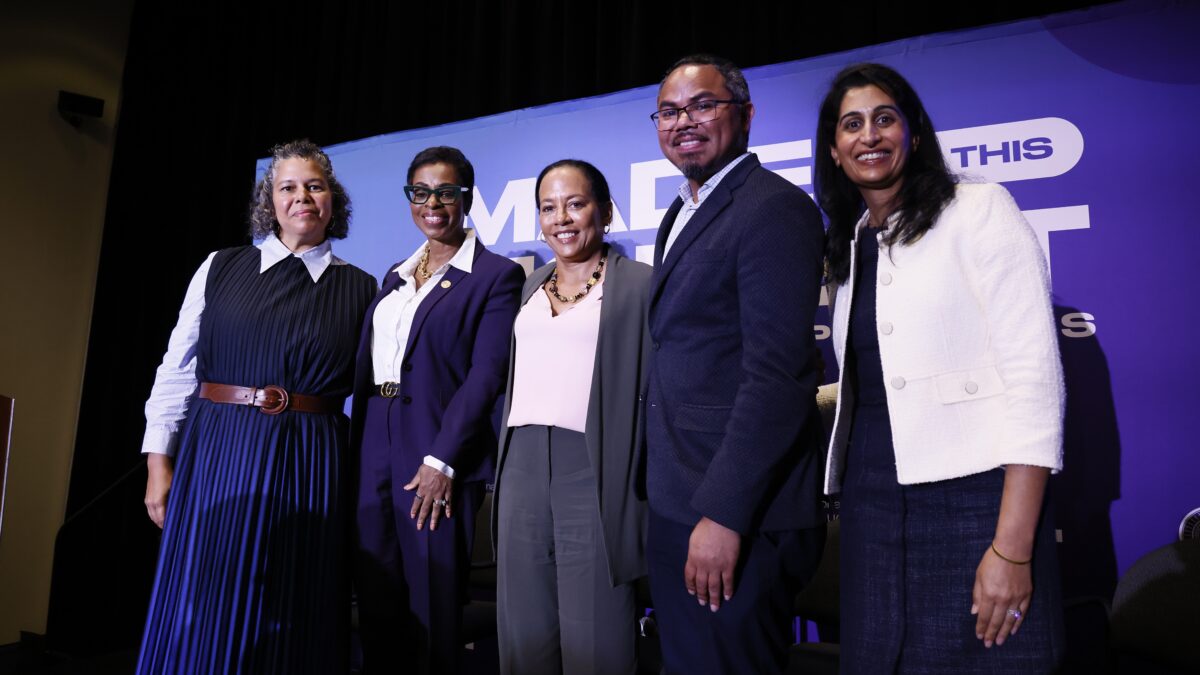Unpacking The Big Bad Bill’s Impact: What It Means for Black Health and Wealth
At the Congressional Black Caucus Foundation’s Annual Legislative Conference (#ALC54), Community Catalyst convened a powerhouse panel to unpack the urgent health and economic consequences of President Trump and congressional Republicans’ so-called “Big, Beautiful Bill” (H.R. 1) – and chart solutions grounded in community power.

Moderated by Rebecca Lowell Edwards of Salt Rock Strategies, the conversation featured:
- Linda Goler Blount, MPH, President & CEO, Community Catalyst
- Joseph Bryant, International Executive Vice President, SEIU
- Karen Boykin-Towns, Vice Chair, NAACP National Board of Directors
- Mona Shah, JD, MPH, Senior Director of Policy & Strategy, Community Catalyst
Four Critical Perspectives
Health Equity
Due to systemic racism that creates economic barriers, Black families depend on Medicaid more than any other community, with 65% of Black mothers and more than half of Black children relying on it for health coverage. H.R. 1 enacted historic health care cuts that strip that foundation away, worsening maternal mortality rates and destabilizing families. 15 million people are going to lose health care coverage as a result of this bill.
“The bill aims to keep people in the dark. While we’re in the dark, they’ll take away health care services.”
Medical Debt & Economic Well–being
Our nation is in a medical debt crisis with 100 million people who owe $220 billion dollars in medical debt that they cannot pay. Medical debt is also one of the leading causes of bankruptcy in the United States. H.R. 1 threatens to make this crisis worse by stripping coverage and leaving families to face unaffordable bills. Hospitals in Black neighborhoods are four times more likely to close. And if ACA tax credits expire, 1.1 million Black people could lose coverage, with premiums doubling in some states.
“Deferred interest credit cards are infiltrating our health system—and they are deeply predatory. Families already struggling with medical bills are pushed into financial traps that only deepen debt and insecurity.”
Workers & Services
Cuts will land hardest on Black health care workers and doctors who disproportionately serve Medicaid patients, while also gutting school-based health services that 70% of districts expect to lose. The result: workers lose jobs, patients lose care, and students lose critical supports.
“When hospitals, schools, or clinics face budget cuts, the first thing they do is come to concessionary bargaining—putting workers’ jobs directly on the line.”
Civil Rights
Health care access has always been a civil rights issue. Overly burdensome and unnecessary work reporting requirements will terminate health coverage from millions of people, disproportionately harming Black families and caregivers facing systemic barriers to employment.
“This bill that is now law is really codifying inequality. [It] takes us back to Jim Crow laws—where segregation was the law of the land. By gutting health care and food assistance programs, Black and Brown communities will be hit hardest.”
Dig Deeper With Our Policy Brief
To expand on the panel’s insights, Community Catalyst released a new brief: The Big Bad Bill Is Now Law: What It Means for Black Health and Wealth.
Stories Behind the Numbers
Panelists and the report lifted up impacted community members like Eboni, a Georgia mother whose Medicaid coverage made cancer treatment available, and Terry, who battled medical debt collectors while grieving his wife and facing his own cancer diagnosis. Their experiences are proof that coverage is not a luxury; it is life, stability, and dignity.
“Knowledge is power and too often, we have no idea what is happening. Stories need to be collected and taken to our elected officials. When we talk about the system, these stories are the concrete examples of what’s actually happening.”
What’s Next
Panelists made clear: the repeal of the health care cuts in H.R. 1 and making ACA tax credits permanent is about justice and smart policy for economic growth.
“Talk to your friends and family because there are things they don’t know. Make sure they understand how important health care is. Yes, it’s a health issue. But it’s also an economic issue, a workforce issue, a civil rights issue, a civil society issue—it’s an issue of democracy.”
– Linda Goler Blount, President & CEO, Community Catalyst
At Community Catalyst, we believe health justice is economic justice. Together with our 300+ partners nationwide, we’re working to ensure that everyone can access affordable, quality care—and that communities most harmed by inequities lead the way toward solutions.
Photos from Congressional Black Caucus Foundation’s Annual Legislative Conference #ALC54
Take Action
- Tell Congress to repeal the harmful health care cuts in H.R. 1 and permanently extend Marketplace tax credits.
- Partner with us—activate your network, share resources, and mobilize others to make a difference.
- Fund the work—donate as an individual, sponsor as a corporation, or invest as a foundation to drive lasting change.
Learn More
- Medical Bills: Everything You Need to Know About Your Rights
- Deferred Interest Credit Cards: A Hidden Medical Debt Trap
- The Truth about Medicaid Work Requirements: Costly, Ineffective, and Harmful
- Your health insurance could cost 20% more next year—here’s why
- It’s Time for Congress to Extend Enhanced Premium Tax Credits – Better Yet, Make them Permanent
